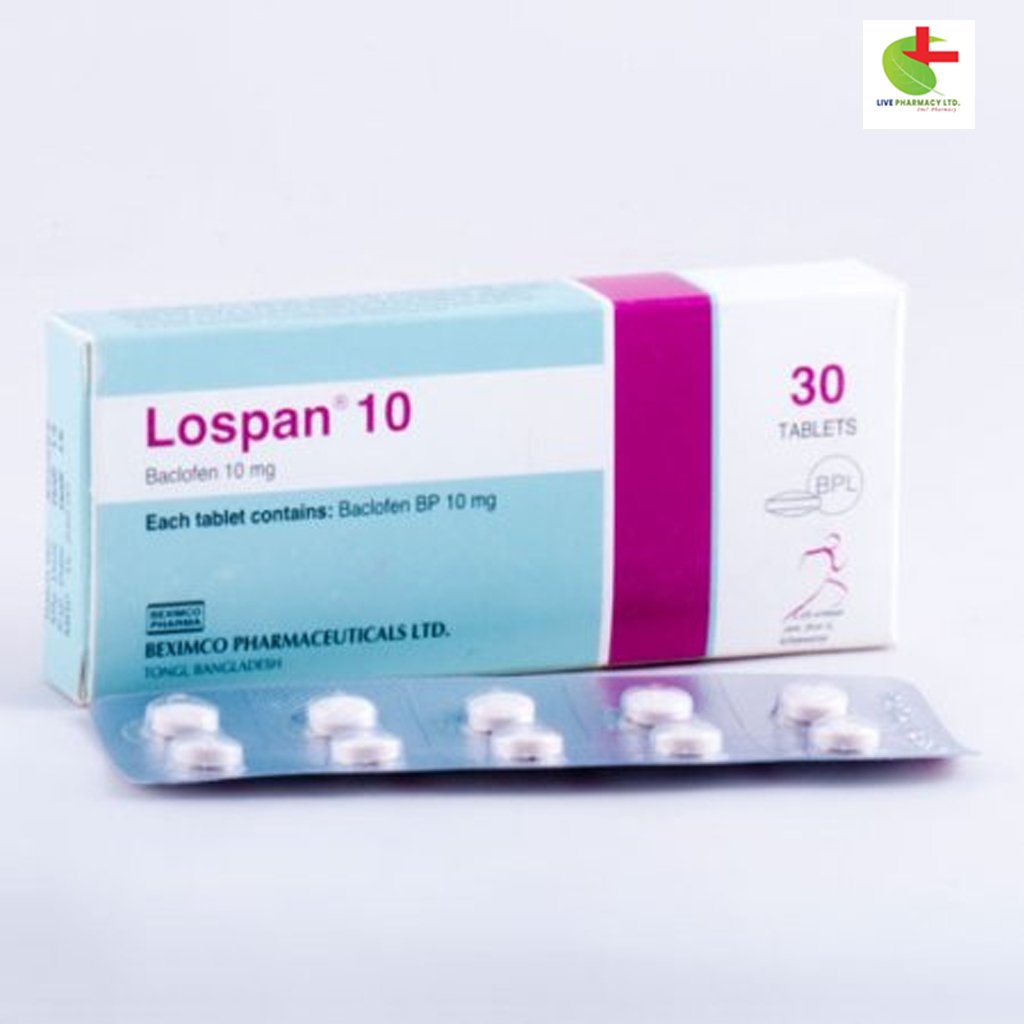Lospan 10
80.00৳ Strip
- Lospan is a centrally acting skeletal muscle relaxant used to treat spasticity from multiple sclerosis, spinal cord injuries, and various neurological conditions.
- Works by stimulating GABAB receptors to inhibit reflexes and reduce muscle spasm.
- Available in oral and IV forms, with dosages tailored to age and condition severity.
- Common side effects include drowsiness and dizziness.
- Requires caution in patients with renal or hepatic impairment.
 Brand
Brand
|
Beximco Pharmaceuticals Ltd |
|---|---|
 Generics
Generics
|
Baclofen |
 Type
Type
|
Tablet |
Indications
Lospan is prescribed for:
- Spasticity related to multiple sclerosis.
- Flexor spasms accompanied by pain, clonus, and muscle rigidity.
- Skeletal muscle spasms due to rheumatic disorders.
- Spinal cord injuries and various spinal cord diseases.
- Conditions resulting from cerebrovascular accidents, neoplastic, or degenerative brain diseases.
Pharmacology
Baclofen works by inhibiting both monosynaptic and polysynaptic reflexes at the spinal level through stimulation of GABAB receptors, which reduces the release of neurotransmitters such as glutamate and aspartate. It may also exert central nervous system (CNS) depression effects and provide antinociceptive benefits.
Dosage & Administration
Adults and Children Over 10 Years: Start with 5 mg three times daily with or after food, gradually increasing to a maximum of 100 mg daily.
Children Under 10 Years: Begin with 2.5 mg (2.5 ml) four times daily, adjusting based on needs:
- 12 months to 2 years: 10-20 mg (10-20 ml) daily.
- 2 to 6 years: 20-30 mg (20-30 ml) daily.
- 6 to 10 years: 30-60 mg (30-60 ml) daily.
- For typhoid fever: 500 mg daily for 7-10 days.
Injection (IV Infusion Only):
- Community-Acquired Pneumonia: 500 mg IV daily for at least 2 days, followed by 500 mg orally to complete a 7-10 day treatment course.
- Pelvic Inflammatory Disease: 500 mg IV daily for 1-2 days, followed by 250 mg orally for a 7-day course.
Interaction
- Increased sedation when combined with CNS depressants, alcohol, or synthetic opioids.
- Enhanced risk of hypotension with antihypertensives; adjust dosage accordingly.
- Potential for intensified effects when used with tricyclic antidepressants.
- Possible mental confusion or hallucinations when combined with levodopa and carbidopa in Parkinson’s patients.
- Caution advised with MAO inhibitors and neuromuscular blockers due to possible synergistic effects.
Contraindications
- Hypersensitivity to Baclofen or other components.
- Use with ergot derivatives is contraindicated.
- Not recommended for patients with hepatic disease.
Side Effects
Common adverse effects include drowsiness, dizziness, weakness, and fatigue. Rare side effects may involve:
- CNS: Headache, insomnia, confusion, hallucinations, tremor, blurred vision, and seizures.
- Cardiovascular: Hypotension and occasional dyspnea.
- Gastrointestinal: Nausea, constipation, dry mouth, and abdominal discomfort.
- Genitourinary: Urinary frequency and, rarely, enuresis or urinary retention.
- Other: Rash, pruritus, weight gain, and visual disturbances.
Pregnancy & Lactation
Baclofen falls under Pregnancy Category B3. Safety during pregnancy has not been established; it crosses the placental barrier. Use only if the benefits outweigh potential risks. It is excreted in breast milk, but quantities are generally considered too small to affect the infant adversely.
Precautions & Warnings
- Lower doses are recommended for patients with renal impairment or undergoing chronic dialysis.
- Caution in patients with psychiatric disorders or a history of peptic ulcers, cerebrovascular diseases, or hepatic, renal, or respiratory failures.
- Monitor respiratory and cardiovascular functions closely, especially in patients with cardiopulmonary conditions.
- Potential neurogenic disturbances affecting bladder emptying; use cautiously.
Overdose Effects
In case of severe overdose, gastric lavage is essential.
Therapeutic Class
Centrally acting skeletal muscle relaxants.
Storage Conditions
Store below 30°C, away from light and moisture, and out of reach of children.













Reviews
There are no reviews yet.